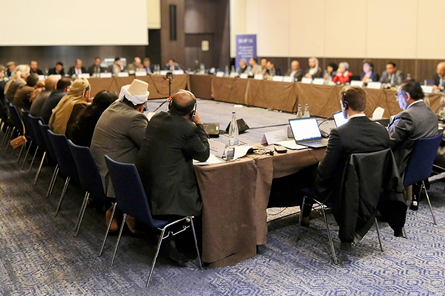Yemen
Since 2018, our programme in Yemen has been working towards two complementary objectives: a) addressing immediate security challenges facing civilians by supporting short-term initiatives; and b) supporting a vision for longer-term security arrangements through gradual confidence-building between all conflict actors.
Through our long-term engagement, we have built trusted relationships with our Yemeni partners across political, tribal and geographical divides and informed the UN-led peace process thanks to our strategic partnership with the Office of the Special Envoy of the Secretary General to Yemen (OSESGY).
For more information about our programme, download our DCAF Yemen Programme Factsheet: Progress towards peace in Yemen through security sector stabilisation.

Workstreams/Projects
1- Convene inclusive dialogues on key security issues impacting the peace process between high representatives of the security sector, tribal leaders and civil society activists;
2- Build the knowledge and technical expertise of grassroot civil society organizations, including women’s and youth organisations, to enable them to engage more meaningfully in security stabilisation efforts; and
3- Produce leading research relevant to Yemen security context to stimulate discussions, identify lessons learnt from past initiatives and draw upon good international peacebuilding practices.
SSG/R needs a political settlement and sufficient government capacity to undertake holistic reform. Such conditions are yet to be met in Yemen, which continues to be characterised by a fragmented security and political environment. Within this context, priority should be given to reducing violence and promoting basic security services to local populations.
Our approach has always recognised this strategic imperative by focusing on Security Sector Stabilisation (SSS), a holistic process applicable to conflict-affected states to improve confidence, facilitate political dialogue and ultimately enable a political settlement that could lead to longer-term SSR.
The desired outcome of SSS is to help local actors create enough political space for political negotiation, to support existing political agreements, and to enable relevant security institutions to increase their legitimacy through the delivery of basic security services that are essential to local populations. It involves pursuing interconnected activities aimed at:
- Reducing violence, making people safer and creating political space for dialogue;
- Developing a framework that supports the resumption of a constructive political process;
- Understanding and engaging as appropriate with local actors across political, geographical and tribal divides; and
- Identifying opportunities for local capacity building and ownership.
To achieve Security Sector Stabilisation in the Yemen context, two preconditions are needed:
- Security and political power are interconnected and should be addressed jointly – our previous experience in other contexts proved that political settlement cannot be achieved without making early security progress, to restore confidence between all actors.
- SSS can only be successful if it is truly inclusive and does not overlook any stakeholders, including non-state militias, informal actors, civil society activists and more tribal leaders, to promote local ownership and allow for a comprehensive, Yemeni owned debate.
Our dialogue component aims to:
- Enhance dialogue between conflict parties on potential confidence building measures: We provide tribal leaders and representatives of security institutions across Yemen’s political divides (including the Presidential Leadership Council (PLC), Ansar Allah (AA), Southern Transitional Council (STC) Islah, the General People’s Congress (GPC), etc.) with a neutral platform disconnected from traditional mediation structures to encourage discussions aimed at building mutual trust, identify concrete measures to alleviate civilian suffering and encourage the adoption of long-term security arrangements in support of the UN-led peace process.
- Improve information sharing on security trends and synergies among local and international security actors: Provide a space for relevant local, regional and international stakeholders, including Yemeni civil society organizations, OSESGY and peacebuilding partners, to periodically share information on the main expectations from and/or latest dynamics between conflict parties, allowing them to adapt their approach and create potential synergies.
Our capacity-building component with grassroot organisations aims to:
- Increase knowledge from grassroot organisations on the nexus between core Security Sector Stabilisation (SSS) principles and peace: Increase local CSOs’ knowledge and understanding of SSS to enable them to conduct research on specific security questions relevant to local communities and/or make concrete recommendations to security stakeholders to channel security needs of local populations and stimulate debate around security and peace.
- Improve interactions and trust between local actors, security institutions and tribes: Foster gradual exchange between security institutions and representatives of all conflict parties across the conflict to normalise interactions and build interest in pursuing efforts towards Security Sector Stabilisation from within the security sector.
Our research component is designed to:
- Improve the capacity of Yemeni researchers to carry out Security Sector Stabilisation studies: Establish a community of practice made of local experts and independent researchers and security practitioners to help us shape the content of our future dialogue sessions, through a bottom-up approach that reflects the needs and expectations of local communities.
- Support the publication of leading studies and analyses on emerging Security Sector Stabilisation topics relevant to Yemen: Produce knowledge products on Security Sector Stabilisation relevant to the Yemen context, to stimulate discussions, identify lessons learnt from past initiatives towards political settlement and draw upon good international peacebuilding practices.
- Sahafah Al-Arab article, "Geneva - DCAF Conference Kicks Off to Discuss the Role of Yemeni Tribes in Peacebuilding," from 6th February 2024
- Yemen Today news on 5th February 2024
- Yemen Daily News article, "Conference in Geneva for 40 Tribal Leaders from Yemen Organized by the United Nations," from 5th February 2024
- Sada Al-Sahel article, "Geneva: Launch of the DCAF Conference to Discuss the Role of Yemeni Tribes in Peacebuilding," from 7th February 2024
- Al-Zaeem News article, "Geneva: The DCAF Conference Kicks Off to Discuss the Role of Yemeni Tribes in Peacebuilding," from 6th February 2024
- ISPI article, Yemen’s Economic Crisis Darkens Security Sector Reform, from August 2022
PUBLICATIONS
Contacts
Khaldoon Bakahail, Senior Strategic Advisor and Coordinator (k.bakhail@dcaf.ch)
Jean Conte, Programme Manager (j.conte@dcaf.ch)
Nadia Ruminy, Junior Project Officer (n.ruminy@dcaf.ch)



